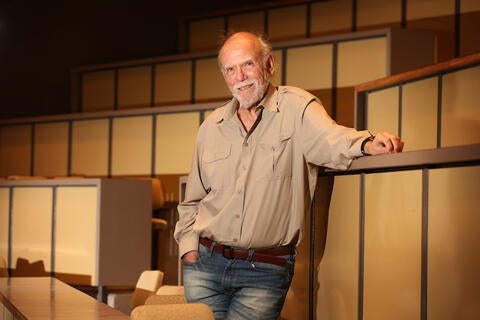Barry Barish, a distinguished professor of physics and astronomy at UC Riverside and a Nobel laureate, has won the Copernicus Prize, bestowed by the government of Poland on “those who made exceptional contributions to the development of world science.”
Barish will receive the prize from the Polish Ministry of Education and Science at the World Copernican Congress to be held in Toruń, Poland, on February 19-21, 2023, celebrating the 550th birthday of Nicolaus Copernicus. Copernicus was born on Feb. 19, 1473, in Toruń.
Along with physicists Rainer Weiss and Kip S. Thorne, Barish was awarded the 2017 Nobel Prize in Physics “for decisive contributions to the LIGO detector and the observation of gravitational waves.” He joined the UCR faculty in 2018.
On Sept. 14, 2015, LIGO, or the Laser Interferometer Gravitational-wave Observatory, detected for the first time gravitational waves predicted by Albert Einstein more than 100 years ago. A collision between two black holes generated the waves, which took 1.3 billion years to arrive at the LIGO detector. Barish brought the LIGO project to completion, enabling the first observation of this phenomenon.
Barish earned his bachelor’s degree in physics in 1957 and his doctorate in experimental particle physics in 1962 from UC Berkeley. He joined Caltech as a postdoctoral researcher in 1963, became a professor in 1966, and was appointed Linde Professor of Physics in 1991. He led the LIGO effort from its inception through the final design stages, and in subsequent discoveries. In 1997, he created the LIGO Scientific Collaboration, which enables more than 1,000 collaborators worldwide to participate in LIGO.
He has served on many science committees, including co-chairing the subpanel of the High Energy Physics Advisory Panel that developed a long-range plan for U.S. high-energy physics in 2001. He chaired the Commission of Particles and Fields and the U.S. Liaison Committee to the International Union of Pure and Applied Physics. He has also been active in a variety of international physics collaborations.
Barish is the recipient of the Fudan-Zhongzhi Science Award (China), Princess of Asturias Prize for Science and Technology (Spain), Giuseppe and Vanna Cocconi Prize from the European Physical Society, the Enrico Fermi Prize from the Italian Physical Society, and the Klopsteg Award from the American Association of Physics Teachers. He is a member of the National Academy of Sciences, which awarded him the Henry Draper Medal. From 2003 to 2010, he served as a presidential appointee to the National Science Board.
He is an elected member of the American Academy of Arts and Sciences and a fellow of both the American Association for the Advancement of Science and of the American Physical Society, where he also served as president. He has received honorary doctorates from the University of Bologna, the University of Florida, and the University of Glasgow.
Known as the father of modern astronomy, Copernicus (1473–1543) was a Polish mathematician and astronomer who proposed in the 1500s that the Earth revolved around a stationary sun — the heliocentric theory of the solar system. He played an exceptional role in science and still inspires scientists worldwide with his achievements.
Copernicus correctly suggested the order of the known planets from the sun and calculated excellent estimates for their orbital periods. He argued the Earth rotated daily on its axis, the gradual shifts of this axis accounting for the seasons. He died of a stroke on May 24, 1543.
